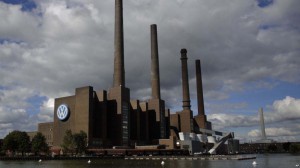This story has been updated with new information.
Volkswagen AG pleaded guilty to three felony counts in U.S. District court in Detroit as part of a $4.3 billion settlement with the Department of Justice.
The guilty pleas were a first for VW, which had never pleaded guilty to any criminal charges before — ever, according to VW officials.
“Your honor, VW AG is pleading guilty to all three counts because it is guilty on all three counts,” said VW general counsel Manfred Doess while entering plea on the company’s behalf. He flew from Germany to Detroit for the trial.
U.S. District Judge Sean Cox accepted the guilty plea to conspiracy to commit fraud, obstruction of justice and entry of goods by false statement charges. However, he said he’d like “a little more time” to consider a motion made behalf of vehicle owners who would like restitution to be higher.
(To see more about the guilty plea, Click Here.)
Despite the Justice Department and VW’s arguments that the agreement was in place and should be enough, Cox said he will consider the new motion and set an April 21 sentencing date.
“This a very, very, very serious crime. It is incumbent on me to make a considered a decision,” Cox said during the hearing.
Following the hearing, Volkswagen issued a statement.
“Volkswagen deeply regrets the behavior that gave rise to the diesel crisis,” the company said the statement. “The agreements that we have reached with the U.S. government reflect our determination to address misconduct that went against all of the values Volkswagen holds so dear. The plea today is another important step forward for our company and all our employees, and we look forward to concluding this matter at the next hearing on April 21, 2017.”
The plea follows a series of civil settlements, and will cost the automaker $4.3 billion, the figure announced in January at a news conference by government regulators just days before the end of the Obama Administration.
Seven current and former Volkswagen employees have faced criminal charges for their role in the diesel rigging, though one has already pleaded guilty. Only one, Oliver Schmidt, of the others is currently in custody.
(VW to now offer two Tiguan models in the U.S. Click Here to learn why.)
All told, the German automaker has so far agreed to spend more than $20 billion in civil and criminal fines and other costs. It is currently ramping up the buyback of around 475,000 2.0-liter diesels equipped with so-called a “defeat device” meant to reduce emissions during emissions testing. A separate deal covers more than 40,000 vehicles with 3.0-liter turbodiesels, though VW believes it can repair some of those.
The company noted that repairing the cars isn’t the only thing it will attempt to fix.
“Since this matter came to light, we have worked tirelessly to address the misconduct that took place within our company and make things right for our affected customers,” VW said. “Volkswagen today is not the same company it was 18 months ago – the change process under way is the biggest in our history. We have taken significant steps to strengthen accountability, increase transparency and transform our corporate culture.
“We know that there is more work to do. We will continue to press forward with these and many other important changes to the way we operate, as we work to earn back the trust of our stakeholders, build a better company and make Volkswagen an example of how a socially responsible company should act and lead in the years ahead.”
Volkswagen isn’t alone in facing substantive legal issues as a number of other automakers and auto suppliers have been hit with criminal sanctions in recent years, however, including General Motors, Toyota and airbag maker Takata.
The federal criminal settlement is expected to be the last major legal action VW faces in the United States, though it must yet negotiate an agreement – or face trial – covering investors who claim that by concealing the rigging of its diesels, VW cost them billions of dollars when its stock price crashed.
The rigging was first made public in September 2015 when the U.S. Environmental Protection Agency announced its findings about the illegal software on VW’s smaller diesel engine. It subsequently also accused the maker of rigging the bigger engine. Those two engines were used not only on models sold with Volkswagen nameplates, but also by the Audi and Porsche brands.
(VW updates Atlas for weekend warriors. Click Here for the story.)
The software was designed to detect when a vehicle was undergoing emissions tests and reduce the level of key pollutants, such as smog-causing oxides of nitrogen. In real-world situations, however, the engines could produce up to 40 times more of the gases.

